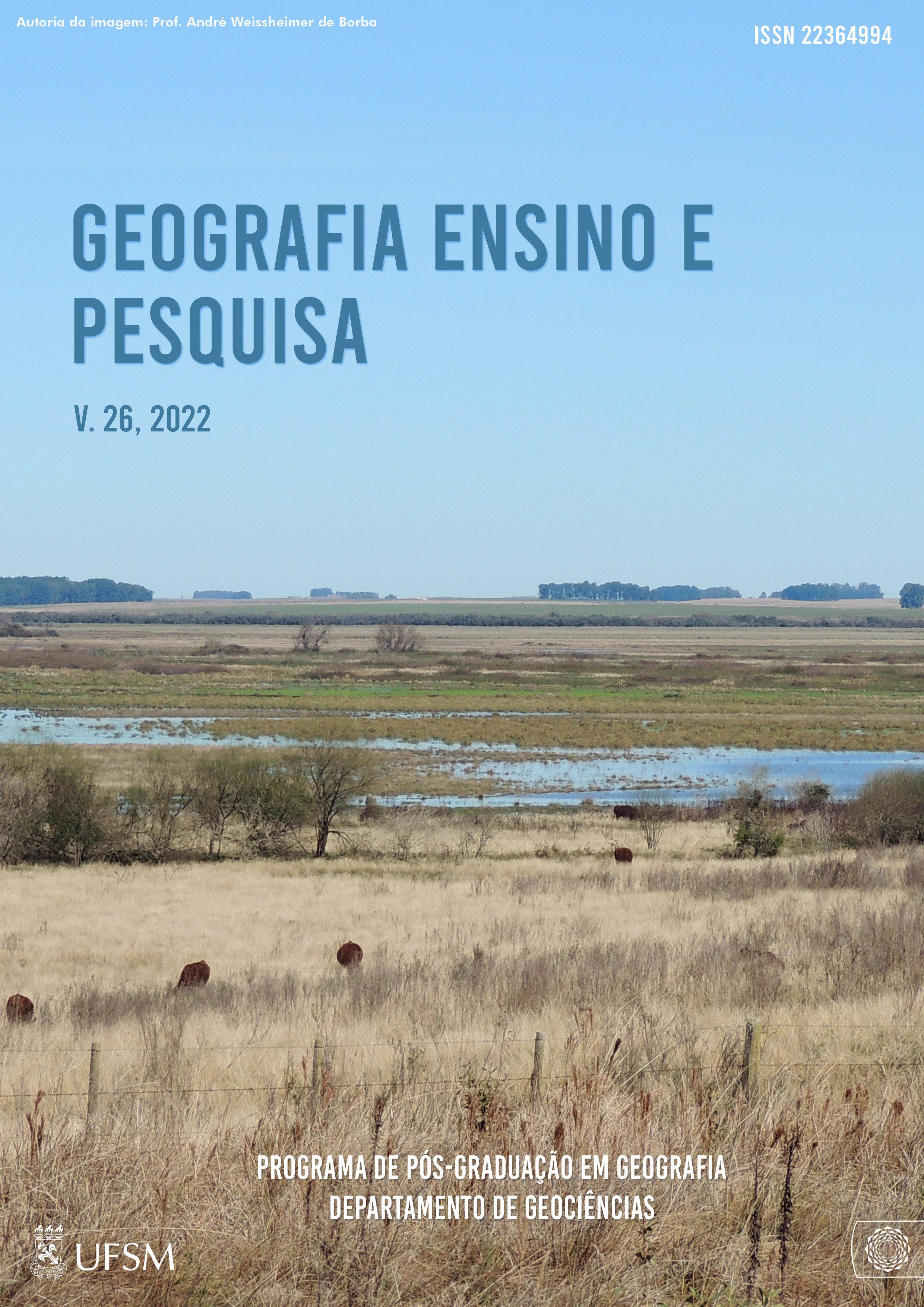Topics on field and city teaching: substantive and syntactic knowledge in Geography
DOI:
https://doi.org/10.5902/2236499467168Keywords:
Content knowledge, field, city, teaching geography, teacherAbstract
This article reflects the importance of Content Knowledge in Geography, considering its value in the characterization of school subjects and, consequently, in the teacher's own identification. We understand that it is not enough to have only the domain of specific knowledge, it is also necessary to be able to bring this knowledge to the understanding of the students. Shulman (1986) points out the need for teachers to understand the structures of their areas of knowledge through Content Knowledge, that is, to have a substantive and syntactic knowledge of the curricular component they teach; being, succinctly, the first related to what is studied, its concepts and principles, and the second, to the investigation method, rules and procedures. Given the diversity of geographic content, we chose the countryside and city theme because it represents, among other reasons, an interesting teaching topic, because, regardless of where the students live, all of them carry in their history ties with the countryside or with the city. Through qualitative research, we sought to understand teaching knowledge and highlight the central role of geographic content.
Downloads
References
ALENTEJANO, Paulo Roberto R. As relações campo-cidade no Brasil do século XXI. Revista de Políticas Públicas, São Luís, v. 7, n. 2, p. 303-328, jul/dez. 2003.
ALVES, F. D. A relação campo-cidade na geografia brasileira: Apontamentos teóricos a partir de periódicos científicos. Geografia Ensino & Pesquisa, Santa Maria, RS, v. 16, n. 3, set./dez. 2012.
BARDIN, Laurence. Análise de conteúdo. São Paulo: Edições 70, 2016.
BOGDAN, R., BIKLEN, S. Investigação Qualitativa em Educação: Uma introdução à teoria e aos métodos. Porto: Porto Editora, 1994.
CASTELLAR, Sonia Maria V. A Formação de professores e o ensino de geografia. Terra Livre. As transformações do mundo da educação: Geografia, ensino e responsabilidade social. Revista da Associação dos Geógrafos Brasileiros, São Paulo, n. 14, p. 51-59, jan./jul., 1999
CAVALCANTI, Lana de Souza. Geografia, escola e construção do conhecimento. 16a. ed. Campinas: Papirus, 2010.
ENDLICH, Ângela Maria. Perspectivas sobre o urbano e o rural. In: SPOSITO, Maria E. B. (Org.). Cidade e Campo: Relações e contradições entre urbano e rural. São Paulo: Expressão Popular, 2006, p.11-31
GARCÍA, Carlos Marcelo. Formação de professores para uma mudança educativa. Porto: Porto Editora,1999.
GROSSMAN, Pamela L; WILSON, Suzzane M; SHULMAN, Lee S. Profesores de sustancia: El conocimiento de la matéria para la enseñanza. Profesorado. Revista de currículum y formación del profesorado. Granada, España, v. 9, n. 2, p. 1-25, 2005. Disponível em: https://recyt.fecyt.es/index.php/profesorado/article/download/42833/24723. Acesso em: 14 jun. 2017.
HESPANHOL, Rosangela Ap. de Medeiros. Campo e cidade, rural e urbano no Brasil contemporâneo. Revista Mercator, Fortaleza, v. 12, número especial (2), p. 103-112, set. 2013. Disponível em: http://www.mercator.ufc.br/index.php/mercator/article/viewFile/1177/499. Acesso em: 18 set. 2018.
IBGE- Instituto Brasileiro de Geografia e Estatística. Classificação e caracterização dos espaços rurais e urbanos do Brasil: uma primeira aproximação, 2017. Disponível em: https://biblioteca.ibge.gov.br/visualizacao/livros/liv100643.pdf. Acesso em: 10 jan. 2020.
LEFEBVRE, Henri. O direito à cidade. 5.ed. São Paulo: Centauro, 2006.
LOPES, C. S.; PONTUSCHKA, N. N. Mobilização e construção de saberes na prática pedagógica do professor de geografia. Geosaberes, Fortaleza, v. 2, n. 3, p. 89-104, 2011.
LOPES, C. S.; PONTUSCHKA, N. N. O conhecimento pedagógico do conteúdo na prática profissional de professores de geografia. GEOUSP Espaço E Tempo (Online), 19(1), 76-92, 2015. Disponível em: https://doi.org/10.11606/issn.2179-0892.geousp.2015.79809. Acesso em: 21 set. 2017.
MARQUES, Marta Inez Medeiros. O conceito de espaço rural em questão. Terra Livre, São Paulo, v. 18, n. 19, p. 95-112, jul./dez. 2002.
MATO GROSSO DO SUL (ESTADO). Referencial Curricular do Mato Grosso do Sul. SED/Mato Grosso do Sul, 2012.
OLIVEIRA, A. U. (Org.). Para onde vai o ensino de Geografia? 4. ed. São Paulo: Contexto, 1994.
ROLDÃO, Maria do Céu. Função docente: natureza e construção do conhecimento profissional. Revista Brasileira de Educação. São Paulo, n. 34, v. 12, 2007, p. 94-103. Disponível em: http://www.scielo.br/pdf/rbedu/v12n34/a08v1234.pdf. Acesso em: 19 set. 2016.
SANTOS, Milton. A Natureza do Espaço: Técnica, Razão e Emoção. 3ª Edição. São Paulo: Edusp (Editora da USP), 2003.
SANTOS, Milton. Metamorfoses do espaço habitado. 6ª.ed. 2. reimp. São Paulo: Edusp, 2014.
SÃO PAULO (ESTADO). Currículo de Ciências Humanas: Geografia. São Paulo: SEE, 2012.
SÃO PAULO (ESTADO). Material de apoio ao currículo do Estado de São Paulo: Caderno do professor Geografia, ensino médio, 2ª série. São Paulo: SE, 2014. Volume 1, 112 p.
SAQUET, Marcos. Por uma abordagem territorial das relações urbano-rurais no Sudoeste paranaense. In: SPOSITO, Maria E. B.; WHITACKER, Arthur M. (Org.). Cidade e campo: relações e contradições entre urbano e rural. São Paulo: Expressão Popular, 2010. p. 157-186.
SCHWAB, J. J. Structure of the Disciplines: Meanings and Significances. In: FORD, G.W.; PUGNO, L. The Structure of Knowledge and the Curriculum. Chicago: Rand McNally & Company, 1964. p. 6-30.
Published
Versions
- 2022-09-26 (2)
- 2022-07-20 (1)
How to Cite
Issue
Section
License
Copyright (c) 2022 Geografia Ensino & Pesquisa

This work is licensed under a Creative Commons Attribution-NonCommercial-ShareAlike 4.0 International License.
The journal Geografia – Ensino & Pesquisa will obtain the auctorial rights for all published texts. This also implies that the text can be published anywhere in the world, including all rights on renewal, expansion and dissemination of the contribution, as well as other subsidiary rights. The author’s get permission to publish the contribution in other medias, printed or digital, may be in Portuguese or translation, since the publication is credited to Revista Geografia – Ensino & Pesquisa.The journal Geografia – Ensino & Pesquisa will obtain the auctorial rights for all published texts. This also implies that the text can be published anywhere in the world, including all rights on renewal, expansion and dissemination of the contribution, as well as other subsidiary rights. The author’s get permission to publish the contribution in other medias, printed or digital, may be in Portuguese or translation, since the publication is credited to Revista Geografia – Ensino & Pesquisa.







